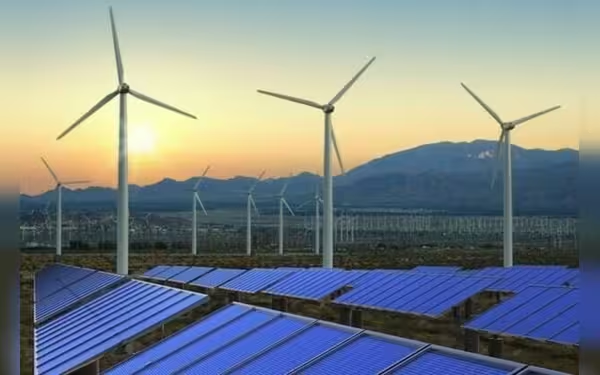Saturday, November 16, 2024 09:42 PM
WEF Urges Pakistan to Seek Global Aid for Renewable Energy Transition
- Pakistan must seek global aid for renewable energy.
- Climate change threatens endangered species and agriculture.
- FCCI proposes solutions to reduce fossil fuel reliance.
 Image Credits: dailytimes_pk
Image Credits: dailytimes_pkWEF calls on Pakistan to seek international aid for transitioning to renewable energy amid climate change challenges.
In recent discussions surrounding climate change and energy production, a significant call to action has emerged from the World Economic Forum (WEF). Hassan Abulenein, the Associate Director of WEF, emphasized the urgent need for Pakistan to seek financial and technical assistance from global organizations such as the United Nations (UN), International Monetary Fund (IMF), and WEF itself. The goal is to transition from fossil fuels to clean renewable energy sources, which is crucial for mitigating the adverse effects of greenhouse gas emissions.
During an online meeting with the Research and Development (R&D) department of the Faisalabad Chamber of Commerce & Industry (FCCI), Abulenein outlined a comprehensive strategy that WEF has developed to phase out hazardous fuels. He pointed out that climate change and rising global temperatures pose significant threats to life on Earth, potentially leading to the extinction of numerous endangered species. This alarming situation calls for immediate action and collaboration.
Engineer Ahmad Hassan, the Convener of the FCCI Standing Committee on R&D, echoed Abulenein's sentiments. He highlighted that global organizations have already proposed a plan to reduce fossil fuel usage by 50% by the year 2030. However, Pakistan currently faces challenges due to Independent Power Producers (IPPs) that generate expensive electricity using fossil fuels. Hassan stressed the importance of leveraging global agreements, such as the UN Sustainable Development Goals and the Paris Agreement, to alleviate the financial burden imposed by these IPPs.
Pakistan possesses immense potential for renewable energy, particularly solar power, with the capability to produce 2.9 million megawatts (MW). Yet, the country is currently only harnessing about 1,000 MW. The R&D department of the FCCI has published a white paper that outlines a comprehensive solution to transition away from fossil fuels and promote clean energy resources. This is a crucial step, especially considering that global warming has increased by an alarming 1.2 degrees Celsius over the past century, leading to unpredictable weather patterns, including floods and storms that severely impact agriculture and infrastructure.
Abulenein urged WEF and other global organizations to direct maximum funding towards clean energy production to minimize carbon emissions. He pointed out that Pakistan has already suffered significant financial losses, amounting to $3.8 billion, due to climate-related disasters, with the floods of 2022 alone causing an estimated $15 billion in damages. The business community, he argued, must advocate for the government to renegotiate terms with IPPs to meet the UN's objective of reducing fossil fuel reliance by 2030.
The transition to renewable energy is not just an environmental necessity but also an economic imperative for Pakistan. By seeking international support and collaborating on innovative solutions, the country can pave the way for a sustainable future. The time to act is now, as the impacts of climate change continue to escalate, threatening both the environment and the economy. It is essential for all stakeholders, including the government, businesses, and citizens, to unite in this critical endeavor for a cleaner, greener Pakistan.













